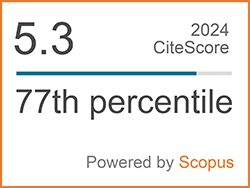Explicit Formulas of Moving Average Control Chart for Zero Modified Geometric Integer Valued Auto Regressive Process
Abstract
Keywords
[1] W. Barreto-Souza, “Zero-modified geometric INAR(1) process for modeling count time series with deflation and inflation zeros,” Journal of Time Series Analysis, vol. 36, no. 6, pp. 839–852, 2015, doi: 10.1111/jtsa.12131.
[2] W. A. Shewhart, Economic Control Chart of Quality of Manufactured Product,” New York: D. Van Nostrand Company, pp. 115–179, 1931.
[3] M. B. C. Khoo, “A moving average control chart for monitoring the fraction non-conforming,” Quality and Reliability Engineering International, vol. 20, pp. 617–635, 2004, doi: 10.1002/qre.576.
[4] D. C. Montgomery, Statistical Quality Control. 6th ed. New York: John Wiley&Sons, 2008, pp. 72–150.
[5] D. Brook and D. A. Evans, “An approach to the probability distribution of CUSUM run length,” Biometrika, vol. 59, no. 3, pp. 539–549, 1972, doi: 10.2307/2334805.
[6] S. V. Crowder, “A simple method for studying run length distribution of exponential weight moving average control charts,” Technometrics, vol. 29, no. 4, pp. 401–407, 1987, doi: 10.2307/1269450.
[7] A. C. Rakitzis, P. Castagliola, and P. E. Maravelakis, “Cumulative sum control charts for monitoring geometrically inflated Poisson processes: An application to infectious disease counts data,” Statistical Methods in Medical Research, vol. 1, no. 1, pp. 1–19, 2016, doi: 10.1177/ 0962280216641985.
[8] A. C. Rakitzia, P. E. Maravelakis, and P. Castagliola, “CUSUM control charts for the monitoring of zero-inflated Binomial processes,” Quality and Reliability Engineering International, vol. 32, no. 2, pp. 413–430, 2016, doi: 10.1002/qre.1764.
[9] A. C. Rakitzis, C. H. Weiβ, and P. Castagliola, “Control charts for monitoring correlated counts with a finite range,” Applied Stochastic Models in Business and Industry, vol. 49, no. 3, pp. 553–573, 2022, doi: 10.1080/02664763.2020.1820959.
[10] S. Sukparungsee, “Average run length of cumulative sum control chart by Markov chain approach for zero-inflated Poisson process,” Thailand Statistician, vol. 16, no. 1, pp. 6–13, 2018,
[11] S. Phanyam, “The Integral equation approach for solving the average run length of EWMA process for autocorrelated process,” Thailand Statistician, vol. 19, no. 3, pp. 627–641. 2021.
[12] Y. Areepon and S. Sukparungsee, “An integral equation approach to EWMA chart for detecting a change in lognormal distribution,” Thailand Statistician, vol. 8, no. 1, pp. 47–61, 2010.
[13] C. Chananet, Y. Areepong, and S. Sukparungsee, “On designing a moving average-range control chart for enhancing a process variation detection,” Applied Science and Engineering Progress, vol. 17, no. 1, 2024, Art. no. 6882, doi: 10.14416/j.asep. 2023.06.001
[14] Y. Areepong and S. Sukparungsee, “The closed-form formulas of average run length of moving average control chart for non-conforming for zero-inflated process,” Far East Journal of Mathematical Sciences, vol. 75, pp. 385–400, 2013.
[15] C. Chananet, Y. Areepong, and S. Sukparungsee, “An approximate formula for ARL in moving average chart with ZINB data,” Thailand Statistician, vol. 13, no. 2, pp. 209–222, 2015.
[16] S. Phantu, S. Sukparungsee, and Y. Areepong, “Explicit expressions of average run length of moving average control chart for Poisson integer-valued autoregressive model,” in Proceeding of the International Multiconference of Engineers and Computer Scientists, vol. 2, pp. 1–4, 2016.
[17] S. Sukparungsee, S. Phantu, and Y. Areepong, “Explicit formula of average run length of moving average control chart for Poisson INMA(1) process,” Advances and Applications in Statistics, vol. 52, no. 4, pp. 235–250, 2018, doi: 10.17654/as052040235.
[18] Y. Areepong, “Moving average control chart for monitoring process mean in INAR(1) process with zero-inflated Poisson,” International Journal of Science and Technology, vol. 4, no. 3, pp. 138–149, 2018, doi: 10.20319/mijst. 2018.43.138149.
[19] K. Raweesawat and S. Sukparungsee, “Explicit formula of ARL on double moving average control chart for monitoring process mean of ZIPINAR(1) model with an Excessive number of zeros,” Applied Science and Engineering Progress, vol. 15, no. 3, 2022, Art. no. 4588, doi : 10.14416/j.asep.2021.03.002.
[20] S. Wiwek and S. Sukparungsee, “Explicit formulas of average run length for mixed moving average-exponentially weighted moving average control chart,” The Journal of KMUTNB, vol. 33, no. 2, pp. 613–625, 2023, doi: 10.14416/j.kmutnb. 2022.06.005.
[21] E. McKenzie, “Some simple model for discrete variable time series,” Journal of the American Water Resources Association (JAWRA), vol. 21, no. 4, pp. 645–650, 1985, doi: 10.1111/j.1752 1688.1985.tb05379.x.
[22] M. A. Al-Osh and A. A. Alzaid, “First-order integer-valued autoregressive (INAR(1)) process,” Journal of Time Series Analysis, vol. 8, no. 3, pp. 261–275, 1987, doi: 10.1111/j.1467-9892.1987. tb00438.x.
[23] M. Bourguinon and C. H. Weiβ, “An INAR(1) process for modeling count time series with equidispersion, underdispersion and overdispersion,” Test, vol. 26, no. 4, pp. 847–868, 2017.
[24] A. C. Rakitzis, C. H. Weiβ, and P. Castagliola, “Control charts for monitoring correlated Poisson counts with excessive zeros,” Quality and Reliability Engineering International, vol. 33, no. 2, pp. 416–430, 2016.
[25] Mathematica, Mathematica Version 6.0, 2012.
DOI: 10.14416/j.asep.2023.09.004
Refbacks
- There are currently no refbacks.
 Applied Science and Engineering Progress
Applied Science and Engineering Progress







